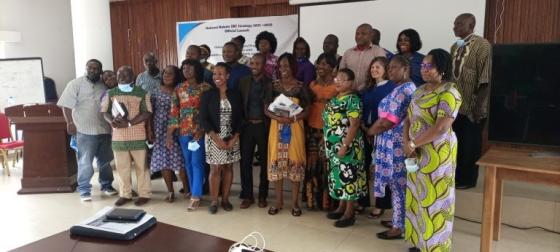Health Ministry Launches National Malaria Strategy Plan

MOH staff and other partners who grace the occasion at the headquarters of the Ministry of Health in Congo Town
The Ministry of Health (MOH) in collaboration with partners has officially launched a five-year National Malaria strategy to strengthen the malaria control system.
The Liberia National Malaria Strategic Plan (NSP) 2021-2025 is a document that redefines the strategic direction of the malaria program.
It seeks to strengthen the management and coordination structure of the health system, as well as, enhancing the system capacities to achieve greater equality, coverage, and quality, for the effective delivery of malaria interventions.
Additionally, the NSP ensures a plan for preparedness and timely response during emergencies for malaria control activities.
The launch of the malaria strategy which took place at the Ministry on Tuesday, November 9, 2021, brought stakeholders from hybrid sectors, with both local and international organizations, including Global Fund, PCU, WHO, UNICEF, USAID/Breakthrough Action, amongst others.
The NSP is also in line with the first National Malaria Social Behavior Change Strategy for Liberia, a plan intended to guide all social and behavior change efforts supporting the objectives of the intervention.
Meanwhile, to ensure the success of the strategy, Deputy Health Minister for Administration, Norwu Howard has called on the public, in general,l to change their behavior on the way they treat their surroundings.
“We must change our behaviors on how we treat the places we lived,” minister Howard cautioned.
The Deputy Minister said that environmental factors such as the presence of bushes and stagnant water around homes were among the few things that the public needs to address.
Also speaking at the program was Oliver Pratt, program manager of the National Malaria program.
She told her audience that though several factors are leading to the breeding of malaria across the nation, with the coming into force of this strategy, there will be room for improvement.
According to Madam Pratt, each of the stated priority areas of the SBC involves a range of actors within the government and external partners.
“The effort of the SBC can only realize its full potential for improving results as the result of improved coordination at the national and sub-national levels,” she explained.
She maintained that the shared agenda for SBC roles and responsibilities were critical to effectively implement the strategy too to fully achieve the objectives.
According to the National Malaria Control Program Manager, the malaria program is responsible for providing leadership, and coordination, to operationalize the strategy for effective collaboration with other multi-sectoral stakeholders at all levels.
“This will scale-up results in high-quality malaria prevention, care, and treatment efforts across Liberia,” she said.
Madam Pratt said there will be regular coordination meetings, message harmonization efforts, information sharing, joint monitoring as outlined in the strategy.
“In addition, it is expected that all stakeholders, including donor partners, will actively participate in providing technical and funding support that is necessary for the intervention,” she said.
For his part, Breakthrough Action’s Chief of Party Dr. Saratu Olabode-Ojo said that positive impacts are being made in the health sector of his organization in twelve of Liberia’s fifteen counties.
Breakthrough Action is USAID's flagship social and behavior change (SBC) project by Johns Hopkins Center for Communication Programs.
According to Dr. Saratu Olabode-Ojo, Breakthrough Action works collaboratively in Liberia with the Ministry of Health at the national and local levels.
He said that the project was designed to improve the effectiveness of the SBC malaria program.
“We implement high-quality SBC activities that will result in improved demand and use of health services for malaria; maternal, neonatal, and child health; nutrition; family planning, reproductive health,h, and many other health programs,” he explained.
Meanwhile, stakeholders who attended the program, have pledged their commitment to support the new malaria strategy for the provision and delivery of quality healthcare to the public.
